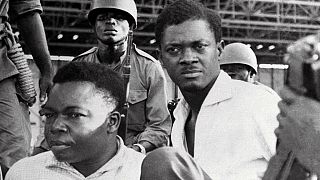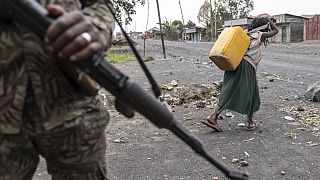Democratic Republic Of Congo
Sixty-two years after the death of anti-colonialist hero Patrice Lumumba, residents of his homeland in the Democratic Republic of Congo await the return of his last remains, one tooth.
The gold-capped tooth was handed over to Lumumba's family from Belgium, as the former colonial power continues to confront its bloody past and look toward reconciliation.
"The father (ed: Lumumba) sacrificed his life for the Congolese people and we also ask the Belgian government to make a historic gesture that generations to come can see," Lumumba's family member, Maurice Tasombo Omatuku, said.
The casket containing the tooth is set to be flown back to the DRC where it will be officially laid to rest at a memorial site.
The country is set to hold three days of "national mourning" from 27 to 30 June, its 62nd anniversary of independence, to mark the burial ceremony.
"My eyes can no longer see, I can no longer walk, but I am very happy to hear that our son's body is coming back, even though I cannot move," a close friend of Patrice Lumumba, Catherine Mbutshu, said.
The restitution of the relic took place after Belgium's King Philippe earlier this month expressed his "deepest regrets" for his nation's abuses in its African former colony, Congo, which is 75 times the size of Belgium.
Following a private ceremony, Belgium's Chief prosecutor Frederic Van Leeuw gave the relatives of Lumumba a small, bright blue box containing the tooth in a televised ceremony.
He said the legal action they had taken to receive the relic had delivered "justice".
The tooth was then placed in a casket that was then draped in the flag of the Democratic Republic of Congo.
Anti-colonial hero
Lumumba was murdered by separatists and Belgian mercenaries in 1961, as an anti-colonial hero.
His assassination and the brutal history of Belgian control of the Congo have been enduring sources of pain between the two countries.
Belgian Prime Minister Alexander De Croo reiterated that his country's authorities bore a "moral responsibility" over the killing.
"I would like, in the presence of his family, to present in my turn the apologies of the Belgian government," he said.
"A man was murdered for his political convictions, his words, his ideals."
A fiery critic of Belgium's rapacious rule, Lumumba became his country's first prime minister after it gained independence in 1960.
But he fell out with the former colonial power and the United States and was ousted in a coup a few months after taking office.
He was executed on January 17 1961, aged just 35, in the southern region of Katanga, with the support of Belgian mercenaries.
His body was dissolved in acid and never found.
But the tooth was kept as a trophy by one of those involved, a Belgian police officer.
The tooth was seized by Belgian authorities in 2016 by the daughter of the policeman, Gerard Soete, after Lumumba's family filed a complaint.
The investigation for "war crimes" is still ongoing but only two of the targeted officials are still alive.
Lumumba remains for many in Congo a symbol of what the country could have become after its independence. Instead, it became mired in decades of dictatorship that drained its vast mineral riches.











Go to video
U.N reports thousands of children raped in Eastern Congo
00:07
Pics of the day: April 11, 2025
Go to video
Africa’s trade winds shift amid tariffs, reforms, and regional tensions {Business Africa}
Go to video
A booming market, but lacking data: Africa's challenge [Business Africa]
02:12
Crucial peace talks in Luanda set to shape Eastern Congo’s future
Go to video
Ugandan judge convicted in UK human trafficking case